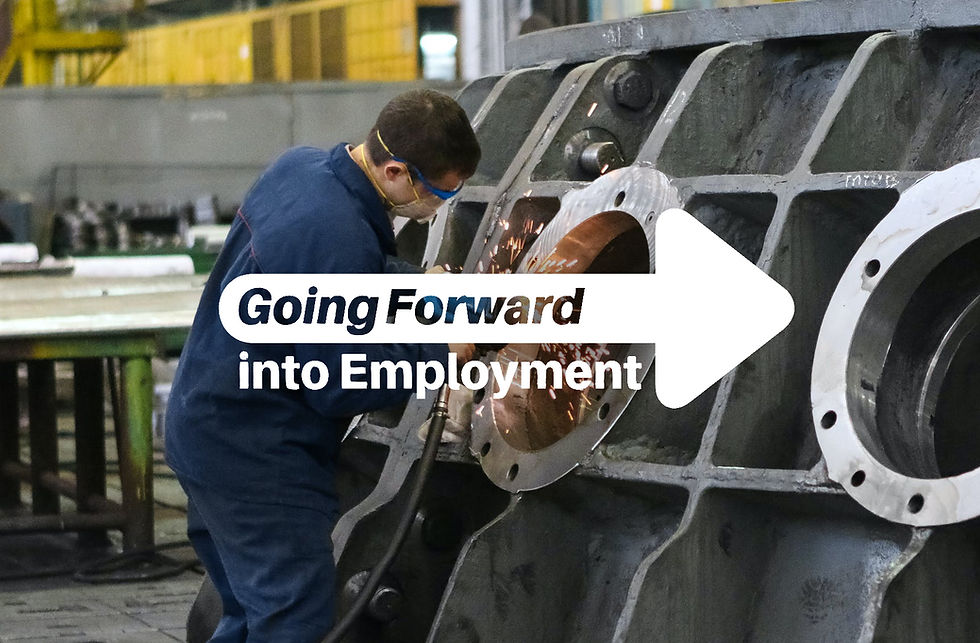Going Forward into Employment
- Jacob Hill

- Apr 27, 2021
- 4 min read
Updated: Jan 28, 2025
By David Heathcote
A third of businesses say they are unable to address skills gaps in their workforce, according to the Chartered Institute of Personnel and Development, yet only 17% of prison leavers are able to secure a job within a year of release. In 2019/20, the Ministry of Justice (MoJ) reported that the target for prison leavers being in employment within six weeks of release was met by just 4% of prisons.
Despite this, and whilst more needs to be done, it is encouraging to see both the direction of travel and positive examples where the Government and the public and private sectors have collaborated to realise the sustainable benefits of employing people with convictions.
Employment is a compassionate route to rehabilitation from a criminal past and generates self-esteem and social mobility for individuals. Being part of a supportive environment and in control of one’s own future provides a sustainable way to breaking the cycle of reoffending.
For the employer, such progressive recruitment can create a positive impression of their organisation, whilst potentially lowering recruitment costs and increasing retention. Employment reduces the likelihood of reoffending by nine percentage points, which is a positive outcome for taxpayers and for society.
Reoffending rates vary with factors such as the number of previous offences, the type of crime committed and the length of custodial sentence served [see Ministry of Justice Proven reoffending statistics quarterly bulletin, October 2018 to December 2018 for the latest published figures]. The value of a nine-point reduction in reoffending can be weighed in this context and on a case-by-case basis as employers and opportunities are matched with prison leavers. The Civil Service has shown, however, that statistics are just part of the story and what really matters are good relationships between the people – the stakeholders – behind the numbers.
Under the leadership of the First Civil Service Commissioner, Ian Watmore, government departments have made important progress in employing prison leavers. Going Forward into Employment (GFiE) is a collaborative project jointly led by the Cabinet Office and the Ministry of Justice, working with the Civil Service Commission, which aims to encourage the employment in the Civil Service of people with convictions.
“The main purpose of the employment programmes is to remove barriers that prevent talented individuals from gaining meaningful employment and to overcome the stigma associated with employing individuals with a criminal background.”
- Civil Service Commission Annual Report and Accounts 2018/19

The pilot project in North West England began in October 2017, working with three low-security prisons, HMP Kirkham, HMP Styal and HMP Thorn Cross, to match individuals on their release with suitable vacancies in the Civil Service, taking into consideration the crimes committed. In 2018 to 2019 the programme expanded recruitment to prisons in London and the South East.
The Civil Service Commission’s 2018/19 annual report celebrated the placement of 22 candidates in posts across seven government departments in a diverse range of junior roles. A further 16 prison leavers were recruited on the programme in 2019/20, taking the total to 38, with a number of additional candidates progressing through the recruitment progress.
“The GFiE scheme has helped me by giving me a real opportunity to change my life. I now have a steady job with a good income, which removes a massive pressure when coming out of prison and allows me to keep my head down and focus on moving on with my life. It keeps my family happy, as they can see I am making progress at turning my life around. It also shows my probation officer I am willing to change and I am rehabilitated after my experience of prison.
“I am happy to be a civil servant and proud to show I have changed and turned my life around. I have enjoyed my experience with the Civil Service and hope my success in this scheme can open the doors for others who really want to change.”
- Candidate appointed through the Going Forward into Employment Programme
With the prison population currently 78,000 according to MoJ figures (0.11% of the UK population as of March 2021), should the total number of people who have served custodial sentences employed within the Civil Service therefore be around 474 if it is to be representative of society? [The Institute for Government reported 430,750 full-time equivalent employees in the Civil Service at the end of September 2020.]
In 2019/20, 44,858 people were recruited into the Civil Service, which means just under 0.04% of whom were appointed through the Going Forward into Employment scheme. After the successful pilot, should the Civil Service now increase the recruitment of prison leavers to 0.11% of the annual total, which would equate to 49 appointments based on 2019/20 recruitment figures?
An opportunity exists for the Government to accelerate the appointment of prison leavers through ‘do as we do’ positive actions such as GFiE. Therefore:
The Civil Service should publish targets for recruiting prison leavers
The proportion of people with convictions employed within the Civil Service and public sector organiations should be published, along with the corresponding figures in society
As Ian Watmore’s five-year term as First Civil Service Commissioner ends in September 2021 and leadership of the scheme is established in the Civil Service Commission Chief Executive’s Office, this pioneering work must continue to be encouraged in its delivery of transformational social value:
“The prize is enormous given the long-term stubborn refusal for reoffending rates to fall significantly. I believe a chance at employment within the civil service could be pivotal.
“Every offender employed by the civil service will have a chance to turn their life around... The civil service will become more broadly representative of the society it serves and other employers will, we hope, follow this lead.”
- Ian Watmore, First Civil Service Commissioner (Guardian, 2017)